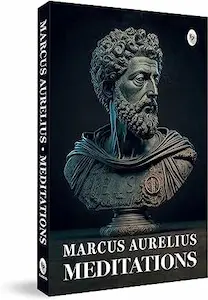Meditations - Summary
Marcus Aurelius

Introduction
“Meditations” is a collection of personal writings by the Roman Emperor Marcus Aurelius. The book is a reflection on his own life experiences and the Stoic philosophy that he followed. It is considered to be one of the greatest works of philosophy and has been a source of inspiration for many people throughout history. In this essay, we will summarize the book and provide examples and anecdotes from the text.
The Life of Marcus Aurelius
Marcus Aurelius was born in 121 AD in Rome. He was adopted by the Emperor Antoninus Pius and became emperor himself in 161 AD. He ruled the Roman Empire for 19 years until his death in 180 AD. Marcus Aurelius was a philosopher and a Stoic. He believed in the importance of self-control, rationality, and the acceptance of fate.
The Structure of “Meditations”
“Meditations” is a collection of 12 books, each containing a series of personal reflections and meditations. The books are not arranged in any particular order and were not intended for publication. They were written by Marcus Aurelius for his own personal use and were never meant to be read by others.
The Themes of “Meditations”
The themes of “Meditations” are centered around Stoic philosophy. The book emphasizes the importance of self-control, rationality, and the acceptance of fate. Marcus Aurelius believed that the key to a happy life was to focus on the things that are within our control and to accept the things that are not.
Examples and Anecdotes from “Meditations”
One of the most famous passages from “Meditations” is the following:
“Everything we hear is an opinion, not a fact. Everything we see is a perspective, not the truth.”
This passage emphasizes the importance of perspective and the fact that our perception of reality is subjective. Marcus Aurelius believed that we should be aware of our own biases and limitations and strive to see things from multiple perspectives.
Another example from “Meditations” is the following:
“If someone is able to show me that what I think or do is not right, I will happily change, for I seek the truth, by which no one was ever truly harmed. It is the person who continues in his self-deception and ignorance who is harmed.”
This passage emphasizes the importance of humility and the willingness to learn from others. Marcus Aurelius believed that we should always be open to new ideas and perspectives and be willing to change our beliefs if they are proven to be incorrect.
Conclusion
In conclusion, “Meditations” is a timeless work of philosophy that has inspired countless people throughout history. The book emphasizes the importance of self-control, rationality, and the acceptance of fate. Marcus Aurelius believed that the key to a happy life was to focus on the things that are within our control and to accept the things that are not. The book is filled with examples and anecdotes that illustrate these themes and provide insight into the mind of one of history’s greatest philosophers.